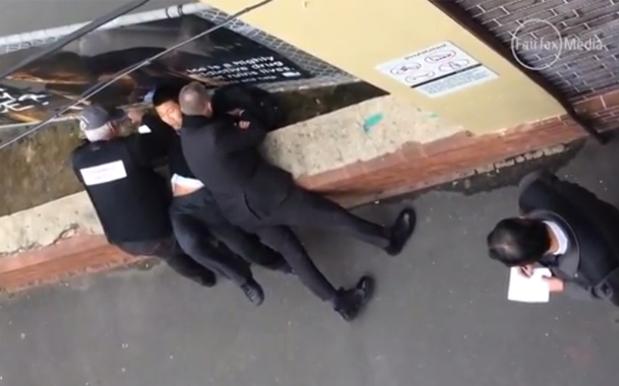
Melbourne’s highly contentious – some might say “a bit bloody ridiculous” – public transport ticketing system Myki is seemingly getting a lot worse before it even thinks about getting better. The introduction of payable on-the-spot fines means you can pay a fine issued by a ticket inspector whilst riding on a tram, but you still can’t buy a ticket for it whilst on board – a move criticised by some as being a means of bullying the public into compliance to hide the gaping legal holes the system currently contains.
But more to that, Public Transport Victoria‘s so-called “Authorised Officers” are under renewed fire after vision surfaced of schoolboy being forcibly pinned down by a pair of Inspectors – who are not now, and never will be, actual Police – following a dispute over the validation of a Myki; a concession fare that, at best, would have ran to a total of just $3.58.
The incident in question occurred at Windsor Station in Melbourne’s south-east. The boy – a student at Christian Brothers College in St Kilda – allegedly attempted to evade Authorised Officers – again, they’re not Police – three times after they requested his Myki card and identification. After returning to the station to collect a wallet he’d dropped, the student presented the card to officers before attempting to snatch it back. At this point two grown men stepped in and pinned the boy against a fence. Video was captured by witnesses and posted to YouTube.
The problem here is the excessive force used by the Authorised Officers – who we cannot stress enough are absolutely not cops – and the parameters of their powers in their role as ticket inspectors for public transport services. You’d think that means a fairly simple system of literally inspecting tickets, but apparently not.
According to the PTV website, Authorised Officers have the power to “see your ticket and concession entitlement where appropriate, even when you have left the vehicle or the paid area of a station,” and “can ask for your name and address and evidence which confirms your identity” if they believe you have committed an offence. The problem here is they don’t have powers of compulsion – they can’t force you to hand over your ID. But if you don’t, they then have the power to “arrest you until the police arrive if you refuse to comply.“
The vague nature of the wording of these powers leaves the door wide open for abuse, and as you can see in the video above, without strict limitations on what is and what isn’t deemed necessary force, things can get out of hand.
They system, as it stands, is not customer-focused, and it’s zero excuse policy creates an atmosphere of fear and distrust among public transport users. When examples of excessive force – which are dishearteningly common – surface, the public’s faith in a failing system only sinks further. They’re shocking incidents of callous overreaction in response to “crimes” that have a monetary value of under $10.
Whether the young boy offended or in any way antagonised the situation becomes a moot point the instant two grown men used their entire bodyweight to physically pin him down while the paperwork for a simple fine was filled out. Just like the initial circumstances became moot the second several “Authorised Officers” bodyslammed a 15 year-old girl into a turnstile at Flinders Street Station in December of last year.
These people are not the Police. Perhaps it’s time they stopped acting as such.
via The Age, Herald Sun.



